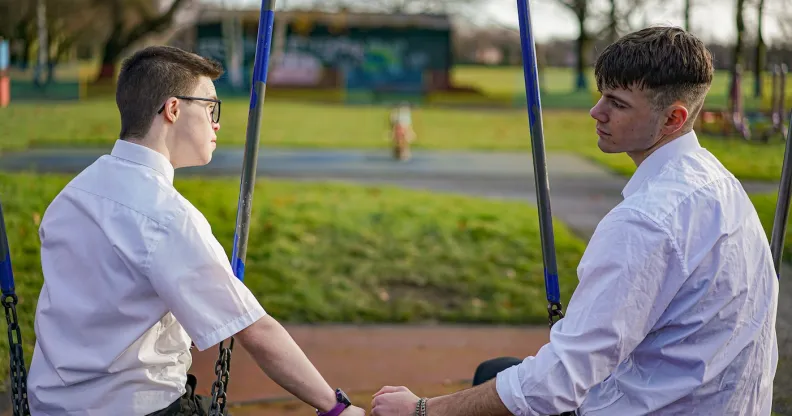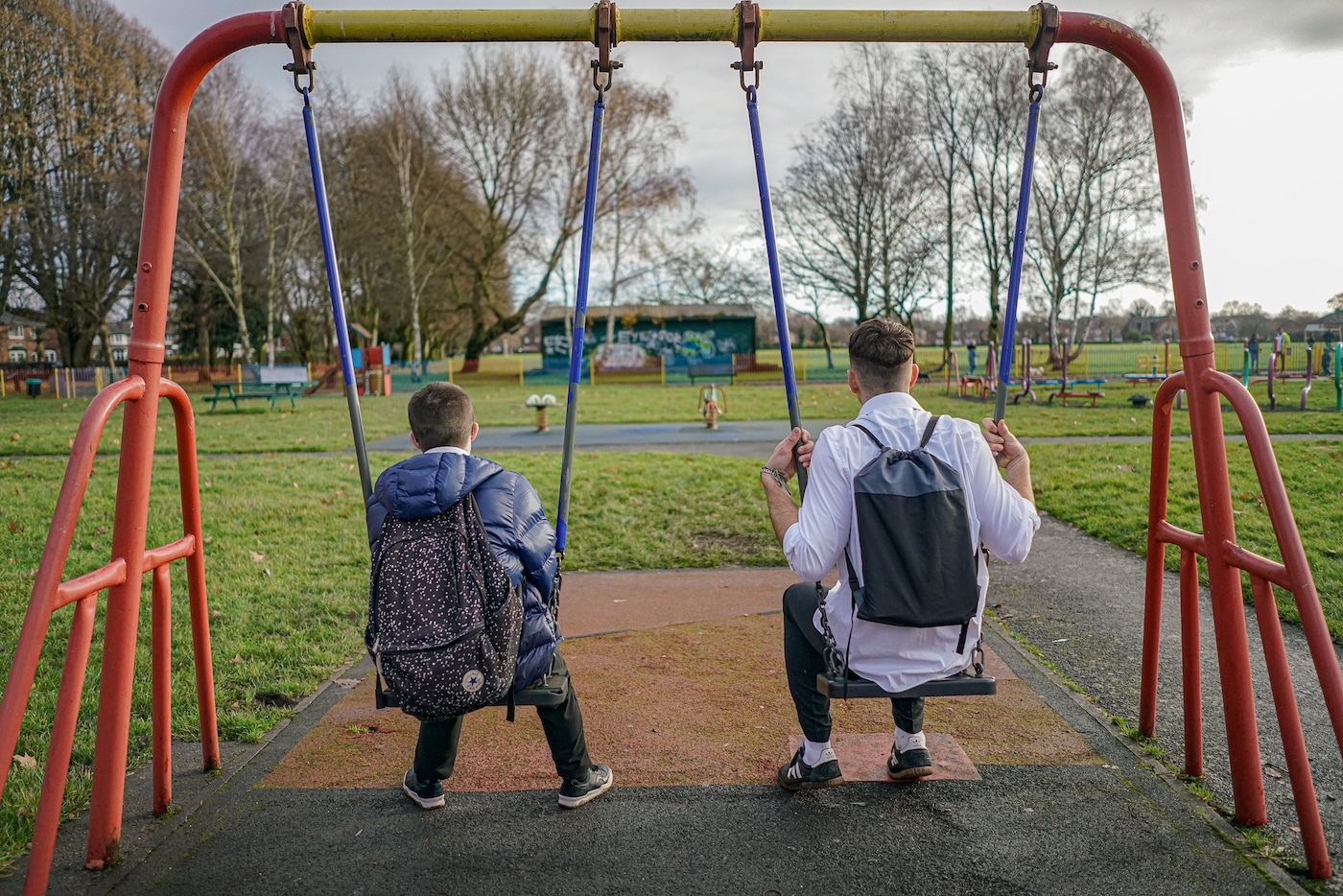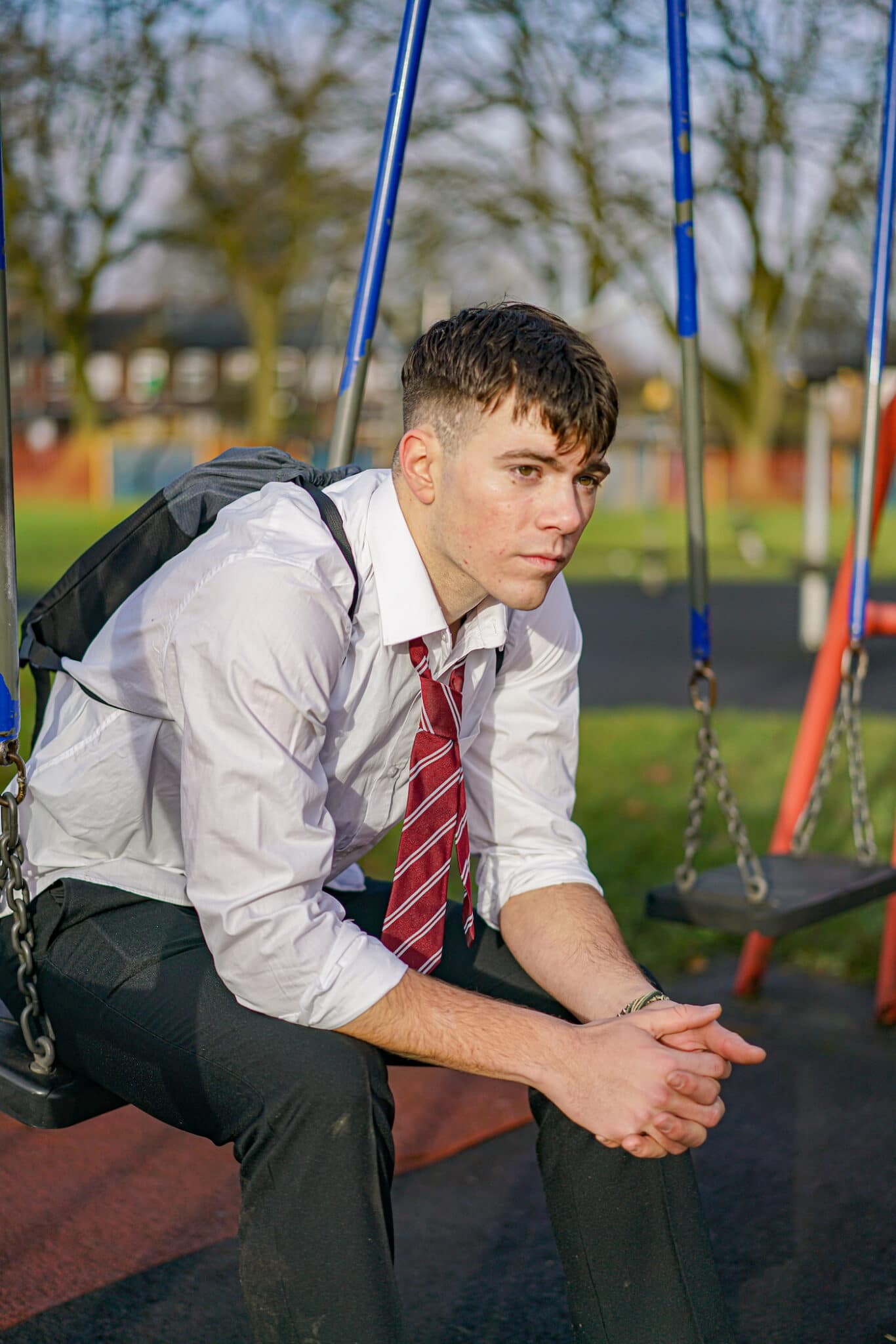Heartfelt film S.A.M celebrates love, queerness and disability in the most beautiful way

George Webster (L) and Sam Retford in S.A.M. (James Kenneth Photography)
“It’s really important to see people like us on screen. We’re people and we exist, and we’re not here to be judged.”
George Webster is talking about the short film S.A.M, which he stars in alongside Sam Retford. The film, written and directed by Neil Ely and Lloyd Eyre-Morgan, follows two teenage boys – both of whom are called Sam – as they form a close bond on the swings at their local park.
It’s a heartfelt film that explores disability, queer love and family ties. Unsurprisingly, it recently picked up the youth audience award at the Iris Prize, Cardiff’s LGBT+ film festival.
To say it’s an important film feels like an understatement. S.A.M is the kind of project the world needs right now – a film that celebrates disability while allowing that community to speak for itself. It’s now two years since S.A.M was filmed over the course of a cold, wet weekend. Its co-stars are still close friends, and they’re excited for the public to see the film that brought them together in a pre-pandemic world.
“To be able to be the voices of a project that is pushing forward such challenging material, and such new material that a lot of people in the industry at the moment are afraid of, is a no-brainer really,” Sam tells PinkNews. “To be part of that has not only educated myself in terms of the integrity of projects I want to be part of in the future, but also, just working with George – we had a great time, didn’t we mate?”
“Yeah,” George laughs. “We had the few days in the park, and we had a workshop. After that me and Sam arranged to have a day out with each other, we had lunch, went back to the house and played FIFA on the XBOX and then we went out for drinks. It was a really nice day.”
“I thought you were going to skip out the part where you took me to the pub!” Sam laughs.
S.A.M actors brought their own experiences and stories to the table
The friendship George and Sam have built in real life is immediately obvious when the pair speak to PinkNews over Zoom. That real-life friendship is the foundation the film rests on. By the time they turned up to film S.A.M, they were comfortable in each other’s company – which was necessary considering the somewhat unorthodox approach taken behind the scenes.
“It was sort of Lloyd and Neil’s way of working, placing the context of the piece in an environment that didn’t necessarily require scripts,” Sam explains. “We’d just sort of play with the lines and the context, and we did some improv. By the time that we got to the park, we had complete trust in each other – we felt free to mess up and be playful, and the stuff that came out ended up being really raw and authentic.”

George Webster (L) and Sam Retford in S.A.M. (Provided)
In addition to exploring disability, S.A.M looks at what it means to be a queer teenager today. George’s character is clearly further along in terms of self-acceptance – he’s confident and openly gay, whereas Sam’s is struggling to fully embrace himself. How did they tap into each character’s respective experiences?
“I’m always really confident… and he’s a confident character,” George says. “He aspires to be a dancer and I’m a dancer myself.” He says it was “really fun” playing a gay character and he’s proud he had the chance to explore that in his first film role.
Sam says he “subconsciously” brought his own experience of disability into the way he portrayed the character. The result was that his character doesn’t really see disability – he just sees somebody he likes.
“It’s never been something I ever think about – you wake up to it, so that’s the norm for me,” Sam says. “Interestingly, I think I subconsciously brought that along with Sam in the film. It ended up working beautifully because I don’t think he at any point saw disability… it was beautiful in a way because it was a sort of honest naivety in that he just saw someone he liked, someone who gave him comfort and made him feel good.”
He continues: “It was really interesting exploring how people make us feel and how love is blind. They don’t really discuss disability in the film, other than discussing it right at the start, but other than that it’s just two guys on a swing.”
The main debilitating factor in the film is upbringing – not disability
For a film that’s so short, it tackles a lot of big themes – another topic it handles with aplomb is that of parental neglect. Sam’s character lives with a mother who has little interest in caring for him, whereas George’s father is fiercely overprotective. Why is it important that we see more stories like this one explored in a meaningful way on screen?
“I think that’s really important to showcase because as much as we develop our personalities, the way we grow up influences who we are as people. That’s a huge dynamic in the film, where these two boys come from. The main debilitating factor is actually not disability – it’s upbringing, and it’s where someone comes from and it’s background.”

Sam Retford in S.A.M. (James Kenneth Photography)
It’s fair to say that film and television still aren’t diverse enough when it comes to representing disabled characters. Films like S.A.M are driving change, but major studios continue to lag far behind. When asked about how the industry can start doing better when it comes to disabled representation, George’s answer is simple.
“I would say one way is to talk to us, understand us, get to know us, so then you will know more about us and we can bring our personal stories into film and TV,” George says. “It’s important to see our faces on screen because we’re not here to be judged. We’re all people, aren’t we? It’s about who you are. I define myself as just George, I don’t define myself as George with Down’s syndrome. So I would say talk to us, get to know us, and respect us.”
Sam agrees. He says people in the film and television industries need to own up to having “difficult conversations” about representation.
“We can’t click our fingers and imagine that everyone is suddenly educated and has real life experience of growing up with people with disabilities,” he says. “We have to motivate ourselves to want to be better so we can have those conversations and feel open to change before that change can take place.”
He draws attention to the BBC series Ralph & Katie as a recent example of a television series paving the way for change.
“The integrity of that show is phenomenal and on a par with the film we made, and their behind-the-scenes representation is utterly fantastic. They’re taking that initiative to bring people along. We need to be open to listening and to having the conversation in the first place – that’s how it’s going to change. Unfortunately, it is going to take time, but being open to that change in the first place I think is the aim.”
S.A.M is due to be released on All 4 in the UK in March.

